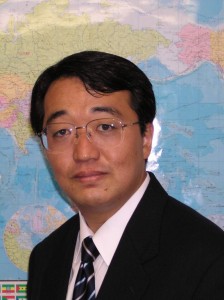緊張と統合:内村鑑三におけるキリスト教と日本の精神
このシリーズでは、私が1994年に執筆した統一神学大学院(Unification Theological Seminary)の神学課程修士論文(Divinity Thesis)を日英二か国語で掲載している。
7.無教会運動の評価の続き
内村の不敬事件、およびそれに引き続く国体との相克は、普遍主義と個別主義の戦いであると解釈することが出来るであろう。後者は日本文化の中に実に深く根ざし、堅固にされていた。我々は日本の歴史の中で、内村のような預言者的人物をめったに発見することが出来ない。唯一の例外は、日蓮宗の創始者である日蓮上人(1222-1282)であろう。したがって内村が日蓮上人を代表的日本人の一人にあげているのも不思議ではない。
むしろ内村の預言者的な精神は、ユダヤ・キリスト教の伝統とより深い連続性を持っている。無教会の教えと不敬事件は、同一の原理にその根本がある。それは第一戒「あなたはわたしのほかに、なにものをも神としてはならない。」(出エ 20:3)なのである。これが内村の普遍主義の底流をなす原理である。もし天皇崇拝が日本版の個別主義であるとするならば、教派主義は西洋版の個別主義であろう。もし不敬事件が政治的権威に対する預言者的戦いであるとするならば、無教会は宗教的権威に対する預言者的な戦いであろう。
B.他律に対する自律的反動としての無教会
宗教組織としてのキリスト教会を背景として見たときに、無教会の持つ意味とは何であるか? この問いに答えるために、私はパウル・ティリッヒが歴史の力学を解釈するときに用いる主要概念の一つである、他律・自律・神律のトリオを紹介したい。この三つは弁証法的な関係にあり、それぞれが正・反・合に相当する。
ティリッヒは、自律を「個人が合理的存在者として、自己自身の中に見出す理性の法則に服従すること」であると定義している。彼はこの言葉の意味を次のように規定している:
それは「自己」を意味する autos と、「法」を意味する nomos という二つのギリシア語から由来している。自律は自己が自己自身に対して法であることを意味する。法がわれわれの外にあるのではなく、われわれの真の存在としてわれわれの内部にあるのである。この語があのギリシア語から由来しているということは、自律が恣意や放恣の反対であることを示している。自律は法を欠如した主観性ではない。
VII. Evaluation of the Mukyokai Movement.(Cont.)
Uchimura’s Lese Majesty Incident and the subsequent conflict with national polity of Japan can be interpreted as the battle between universalism and particularism; the latter was so firmly rooted and solidified in Japanese culture. We can hardly find such a prophetic figure like Uchimura in Japanese history. The only exception may be Nichiren (1222-1282), who is the founder of the Pure Land sect. It is not occasional, therefore, that Uchimura regards Nichiren as one of the representative Japanese.(18)
Rather, his prophetic spirit has much continuity with the Judeo-Christian Tradition. The Mukyokai doctrine and the Incident of Disloyalty have their roots in the same principle, that is, the First Commandment: “You shall have no other gods besides me. (Ex. 20:3)” This is the underlying principle of his universalism. If the emperor worship was the Japanese version of particularism, denominationalism was the Western version of particularism. If the Incident of Disloyalty was a prophetic battle against political authority, the Mukyokai was a prophetic battle against religious authority.(19)
B. The Mukyokai as the Autonomous Reaction against Heteronomy
What is the meaning of the Mukyokai in the universal dynamics of religion? In order to answer this question, I would like to introduce the trio of heteronomy, autonomy, theonomy, that is one of Paul Tillich’s major concepts by which he interprets the dynamics of history. These three are in dialectical relationship, in which they correspond to thesis, antithesis, and synthesis, respectively.
Tillich defines autonomy as “the obedience of the individual to the law of reason, which he finds in himself as a rational being.”(20) He clarifies the meaning of this term as follows:
It is derived from two Greek words, autos, which means “self,” and nomos, which means “law.” Autonomy means being a law to oneself. The law is not outside of us, but inside as our true being. The Greek origin of the words shows clearly that autonomy is the opposite of arbitrariness or willfulness. Autonomy is not lawless subjectivity.(21)
(18)op cit, Uchimura, Shinkou Chosaku Zenshu, VI, p.109-33.
(19)Yoshiharu Hakari, Mukyokai no ronri [Logic of the Mukyokai]. (Tokyo: Hokuju Shuppan, 1988), p.4.
(20)Paul Tillich, Systematic Theology, Three volume in one (Chicago: The University of Chicago Press, 1967), Vol. I, p.84.
(21)Paul Tillich, Perspectives on 19th and 20th Century Protestant Theology, edited and with and Introduction by Carl E. Braaten, (New York, Evanstone, and London: Harper & Row, Publishers, 1967), p.25.
